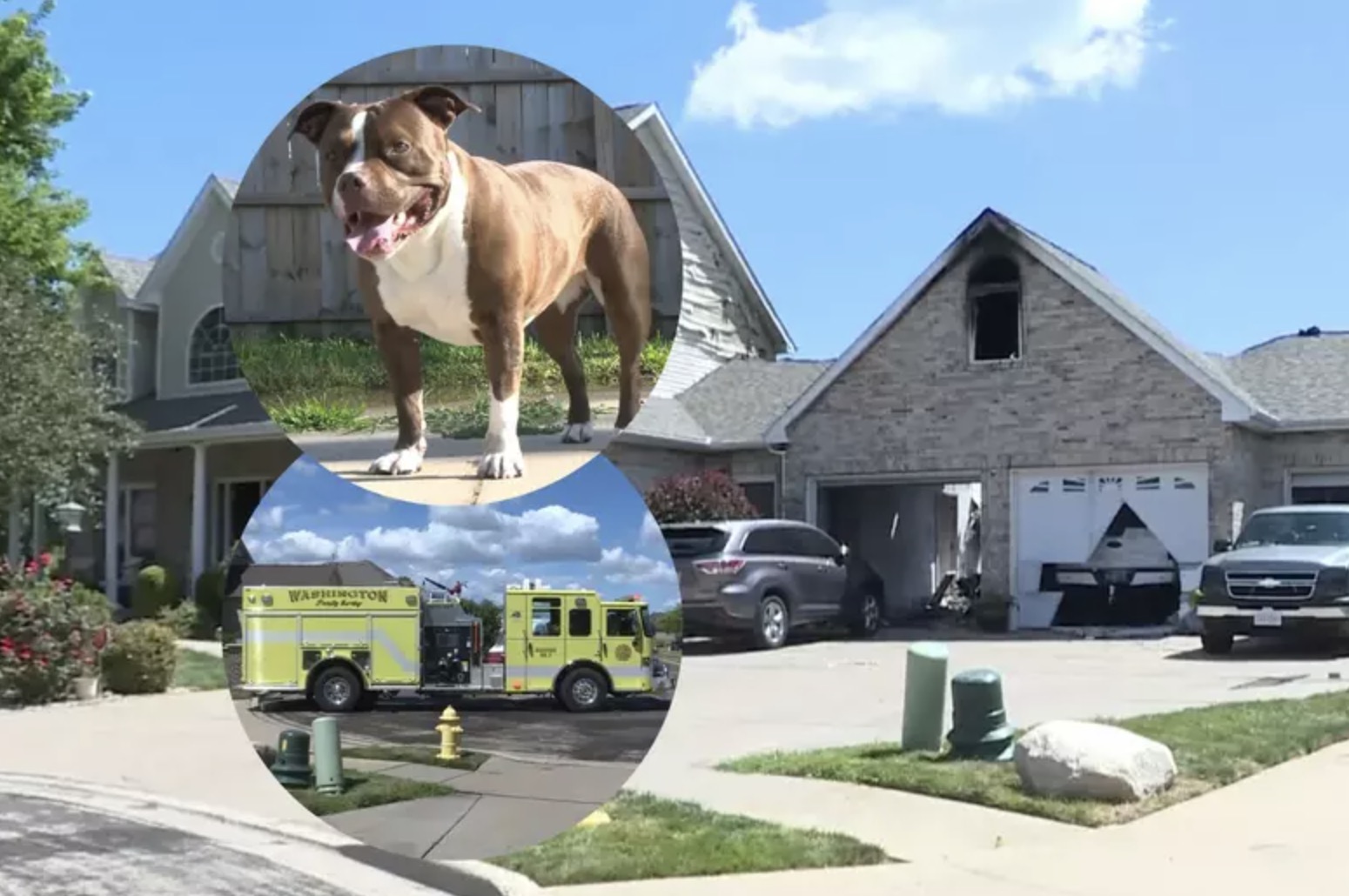Pitbull House in Disrepair Ownership and Community Impact
In the lush, well-to-do neighborhood of Pinecrest in Port Saint Lucie, Florida, a controversy is brewing over a property reportedly linked to Armando Christian Pérez, better known as Pitbull, the world-renowned rapper dubbed “Mr. Worldwide.” This house, purportedly a part of Pitbull’s real estate portfolio, stands in stark contrast to the manicured lawns and pristine facades that characterize one of Miami’s most affluent areas. The Pitbull house has become a focal point for neighborly discontent due to its neglected state.
From the street, the property presents a sorry spectacle: the yard is overgrown and cluttered with fallen branches, a fence lies in disrepair, and the once vibrant exterior is now blighted with mold. Such disarray is not only unsightly but also unexpected in Pinecrest, where residents pride themselves on maintaining their homes to the highest standards. The state of the Pitbull house has left many questioning how the residence of an international music icon could fall into such disrepair.
Local residents express their frustrations openly, lamenting the decline of what could potentially enhance the neighborhood’s charm and value. They speculate on the absentee ownership as rumors swirl that the house isn’t directly owned by Pitbull himself but rather by an entity possibly connected to him, raising questions about the responsibilities of celebrity homeownership and property management. As the community seeks answers and actions to restore the property, the situation at the Pitbull house highlights the broader implications of celebrity-owned real estate and the expectations placed on public figures to uphold their image not just personally but also in their investments.
| Aspect | Details |
|---|---|
| Location and Owner | The property in question is located in the affluent neighborhood of Pinecrest in Port Saint Lucie, Florida, and is reportedly linked to rapper Pitbull. |
| Condition of Property | The house is in a state of neglect, with an overgrown yard, a broken fence, and a moldy exterior, which stands in contrast to the well-maintained area. |
| Community Response | Local residents are discontented and concerned about the property’s poor condition, questioning the impact on neighborhood charm and property values. |
| Speculations and Expectations | There is speculation that the property might not be directly owned by Pitbull but by an associated entity. The situation raises questions about the responsibilities of celebrities in managing their real estate investments. |
Contents
The State of the Property
Nestled in the affluent Pinecrest area of Port Saint Lucie, FL, the property associated with Pitbull stands as a glaring outlier amid its well-kept surroundings. The state of the house is alarmingly poor, with numerous visible signs of neglect. The yard, once presumably landscaped and orderly, now overflows with weeds and scattered debris. Downed trees—remnants of past storms perhaps—remain where they fell, unattended and decaying. The fence that once demarcated the property’s boundaries lies in tatters, sections of it toppled and broken, offering no semblance of security or privacy.
The house itself bears the marks of deterioration: the exterior walls are covered with mold and mildew, suggesting prolonged neglect and exposure to the elements without maintenance. Windows are grimy, and the paint is visibly peeling, detracting further from the aesthetic that one would expect in such a high-value district.

Local reactions are a mix of disappointment and outrage. Neighbors express their dissatisfaction vocally, concerned not only with the eyesore the property has become but also with the potential impact on their own property values. Community members have reached out to local authorities and the media, hoping for intervention that will compel the owner to restore the property to an acceptable state. Some passers-by, aware of the celebrity connection, are surprised and disheartened to see a residence linked to a figure like Pitbull in such a state. The community’s calls for action underscore a collective sentiment that something needs to be done swiftly to address the property’s condition.
| Aspect | Details |
|---|---|
| Condition of Property | The property is in a state of severe neglect, with overgrown weeds, debris, downed trees, a broken fence, moldy exterior walls, grimy windows, and peeling paint. |
| Community Reaction | Neighbors are disappointed and outraged, concerned about the negative impact on their property values and the neighborhood’s aesthetic. They have sought intervention from local authorities and media. |
| Public Perception | Passers-by and community members are surprised to see a property linked to a celebrity like Pitbull in such poor condition, prompting calls for urgent action to restore the property. |
Ownership Controversy
Initially, the disrepair of the Miami home led many to believe that Pitbull himself was the owner, given his ties to the city and his moniker “Mr. 305.” However, a deeper investigation into the property records reveals a more complex ownership structure. The property is, in fact, owned by ENPI GAO, LLC—a company that was established and purchased the house in February 2015 for $850,000. This revelation has shifted the narrative from individual negligence to potential corporate oversight.
Further digging into the LLC provides even more intriguing details. ENPI GAO, LLC shares an address with several other businesses, including Mr. 305, Inc., which is Pitbull’s record label. This connection has led to speculation about the rapper’s involvement with the LLC and, by extension, the property. Candice J. Hart, a senior associate attorney at Business Law Group, P.A., notes that while the LLC’s formation might have been primarily for acquiring the property, the ties to Pitbull’s business endeavors suggest a deliberate financial strategy rather than direct oversight of property management.

This nuanced ownership scenario complicates the community’s demands for accountability. While neighbors believe Pitbull should take responsibility due to his indirect connections, the legal structure of LLCs serves to shield its owners from direct liability. This means that while the celebrity may be linked to the owning entity, he is not legally obligated to manage or maintain the property directly. Such arrangements are common among high net worth individuals who diversify their investments through various corporate entities to manage risk and liability. The complexity of these arrangements often leads to situations where asset management becomes depersonalized and, as seen in this case, potentially neglected.
In conclusion, while the community’s grievances are valid and pressing, the resolution may not be straightforward due to the intricate layers of ownership and responsibility defined by corporate law. The ongoing controversy not only raises questions about celebrity responsibility and real estate management but also highlights the broader implications of property ownership within complex legal entities.
| Aspect | Details |
|---|---|
| Initial Assumptions | Many believed Pitbull owned the deteriorating Miami home due to his strong ties to the city. However, property records show it is owned by ENPI GAO, LLC. |
| Ownership Details | ENPI GAO, LLC, purchased the property in February 2015 for $850,000. This LLC is linked to Pitbull’s record label, Mr. 305, Inc., suggesting indirect involvement. |
| Legal and Financial Strategy | The use of the LLC may be part of a financial strategy to manage risk and liability, common among celebrities, rather than direct oversight of the property. |
| Community Response and Legal Implications | The complex ownership complicates community demands for accountability. Although Pitbull is indirectly connected, the legal structure of LLCs shields owners from direct liability, affecting direct management responsibilities. |
Legal Insights on Liability
Candice J. Hart, a senior associate attorney at Business Law Group, P.A., provides critical insights into the complexities of property ownership through limited liability companies (LLCs) and the implications for individual liability. According to Hart, an LLC is designed to separate personal assets from business liabilities, effectively protecting individual owners from direct legal claims associated with the company’s operations or responsibilities.
In the case of the property reportedly associated with Pitbull, the actual owner is ENPI GAO, LLC, not the rapper himself. This setup insulates him from direct responsibility for the maintenance of the property. Hart emphasizes that “the separation of personal and business liabilities is a fundamental principle of LLCs. This means that even if an LLC fails to maintain a property, the personal assets of the owners, like Pitbull, are not typically at risk.”
The community’s frustration with the property’s state, while understandable, confronts a legal barrier where the direct involvement of the celebrity in question is minimal or non-existent in terms of legal liability. Hart points out that while the celebrity might be morally questioned by the public for neglect, legally, his connection via an LLC does not equate to personal responsibility. This distinction is crucial in understanding why actions haven’t been taken by Pitbull himself to address the property issues.
| Aspect | Details |
|---|---|
| Role of LLCs in Property Ownership | LLCs separate personal assets from business liabilities, protecting individual owners from direct legal claims related to the company’s operations. This structure insulates owners like Pitbull from direct responsibility for property maintenance. |
| Specific Case of Pitbull’s Property | The property is owned by ENPI GAO, LLC, not Pitbull himself, which legally protects his personal assets from issues arising from the property’s state. |
| Legal and Moral Responsibility | While there may be public moral scrutiny on Pitbull for the property’s neglect, legally, his indirect connection through an LLC means he is not personally responsible for maintenance or legal liabilities. |
| Community Frustration and Legal Barriers | The community’s frustrations face legal barriers as the direct involvement of Pitbull in managing the property is minimal, highlighting a key legal principle of LLCs regarding liability and property management. |
Financial Management and Asset Diversification
High net worth individuals often engage in extensive financial management strategies to protect and grow their wealth. Asset diversification is a key component of this strategy, involving the distribution of investments across various asset classes and structures, including real estate via LLCs. This approach not only minimizes financial risk but also complicates the direct management of individual assets.
The use of LLCs for holding assets, especially real estate, provides a layer of anonymity and legal protection, which can be advantageous in terms of liability and tax considerations. However, as seen in the case of the property in Miami, this can lead to situations where the true ownership—and thus responsibility for upkeep—is obscured. The management of such properties can become a lower priority, leading to potential neglect if not properly overseen by a designated manager or management company.

Hart further explains, “When individuals like Pitbull diversify their investments into entities such as LLCs, they might not even be aware of the day-to-day issues of each asset, relying instead on managers or management firms. This can lead to oversight issues, particularly if the asset does not directly affect the owner’s personal or business dealings.”
The role of LLCs in asset management is to act as a shield, protecting owners from direct exposure to liabilities and facilitating easier, more efficient management of diverse portfolios. However, this separation can also lead to decreased oversight and maintenance, as the personal connection to the asset is less direct. In scenarios like the Miami property, this structure raises important questions about the balance between legal protection and ethical responsibility in asset management.
| Aspect | Details |
|---|---|
| Asset Diversification Strategy | High net worth individuals often distribute investments across various asset classes, including real estate through LLCs, to minimize financial risk and enhance wealth protection. |
| Role of LLCs | LLCs provide anonymity and legal protection, crucial for liability and tax considerations, and complicate the direct management of assets due to their structure. |
| Management Challenges | The use of LLCs can obscure true ownership and responsibility, potentially leading to neglect if assets are not actively managed by dedicated personnel or companies. |
| Implications for Owners | Owners like Pitbull may not be closely involved in the day-to-day management of diversified assets, leading to oversight issues, especially when the assets are managed by third parties. |
| Ethical vs. Legal Responsibility | The separation provided by LLCs raises questions about the balance between legal protection and ethical responsibility in asset management, as seen in the maintenance issues of the Miami property. |
Municipal Responsibility and Actions
Municipalities like the City of Miami have specific roles and responsibilities when it comes to managing properties within their jurisdiction, especially those that fall into disrepair and potentially affect the local community’s standard of living. In the case of the property reportedly connected to Pitbull, the city has a duty to enforce local housing codes and ordinances to ensure neighborhood safety and aesthetics.
The city has already taken several actions in response to the neglected state of the property. Notices of violations have been issued to the registered owner, ENPI GAO, LLC, citing the various issues from unkempt lawns to structural disrepair. These notices are often the first step in a legal process designed to compel property owners to take corrective action. In addition, fines are accruing on the property for each day that it remains in violation of local codes, which can add a significant financial burden and serve as a strong incentive for compliance.

Looking ahead, if these initial measures fail to motivate the necessary repairs and maintenance, the city may escalate its actions. This escalation can include placing a lien on the property for unpaid fines and, ultimately, foreclosing on that lien to recover the owed amounts. However, these actions are not without their challenges; they require legal proceedings, consume government resources, and can be time-consuming, sometimes taking years to resolve fully.
| Aspect | Details |
|---|---|
| Municipal Responsibilities | The City of Miami enforces local housing codes and ordinances to maintain safety and aesthetics within the community, especially for properties in disrepair. |
| Actions Taken | Notices of violations have been issued to ENPI GAO, LLC for issues such as unkempt lawns and structural disrepair. Fines are accruing daily, which serve as incentives for compliance. |
| Potential Future Actions | If compliance is not achieved, the city may escalate actions to include placing liens on the property for unpaid fines and potentially foreclosing on those liens to recover costs. |
| Challenges and Considerations | Enforcing these measures involves legal proceedings and significant government resources, and can be a lengthy process with complex legal and financial implications. |
This investigation into the neglected property reportedly linked to Pitbull has uncovered multiple layers of ownership, liability, and responsibility. The ownership of the property by an LLC, while providing legal and financial shielding for the individuals involved, including the celebrity rapper, complicates the direct accountability for its upkeep.
From a legal standpoint, the liability lies with the LLC and not with Pitbull personally, highlighting the protections afforded by such corporate structures. Meanwhile, the city has assumed its role in enforcing property standards, although its actions are bound by legal and procedural constraints that can delay resolution.
This scenario serves as a poignant example of the complexities that arise at the intersection of celebrity-owned properties, legal entities, and municipal responsibilities. It underscores the delicate balance between using celebrity status for privacy and financial management versus the ethical considerations and community expectations that accompany property ownership in high-profile areas.
Ultimately, the case reflects broader implications for celebrities and their real estate investments, particularly in affluent areas where community standards are high and tolerance for neglect is low. It also raises questions about the effectiveness of using corporate structures for asset management and the potential need for more direct oversight to prevent similar situations in the future.
VIP Real Estate -Bryce Harper House into the Home of a Phillies Superstar
Behind Jalen Hurts’ House A Look at the Eagles QB Residence
Almshouse Road Mansion Owner Reveals Challenges and Changes Over the Years
Inside the James Franklin House Nashville Listed as He Moves
Inside Whitney Rose Home For Sale A Luxurious Property Now
Explore the Elegance A Tour Inside Rodney Carrington House
Step Inside A Look at Ron Rivera Home Stunning
